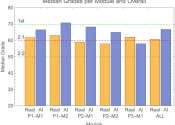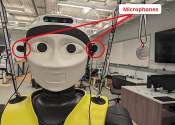Think you're funny? ChatGPT might be funnier
A study comparing jokes by people versus those told by ChatGPT shows that humans need to work on their material.
Jul 3, 2024
0
57
PLoS ONE is an open access peer-reviewed scientific journal published by the Public Library of Science (PLoS) since 2006. It covers primary research from any discipline within science and medicine. All submissions go through an internal and external pre-publication peer review but are not excluded on the basis of lack of perceived importance or adherence to a scientific field. The PLoS ONE online platform has post-publication user discussion and rating features. PLoS ONE was launched in December 2006 as a beta version. It launched with Commenting and Note making functionality, and added the ability to rate articles in July 2007. In September 2007 the ability to leave "trackbacks" on articles was added. In August 2008 it moved from a weekly publication schedule to a daily one, publishing articles as soon as they became ready. In October 2008 PLoS ONE came out of "beta". Also in September 2009, as part of its "Article-Level Metrics" program, PLoS ONE made the full online usage data for every published article (HTML page views, PDF, and XML downloads) publicly available.
Machine learning & AI

A study comparing jokes by people versus those told by ChatGPT shows that humans need to work on their material.
Jul 3, 2024
0
57
Machine learning & AI

Experienced exam markers may struggle to spot answers generated by Artificial Intelligence (AI), researchers have found.
Jun 26, 2024
0
40
Consumer & Gadgets

Including "tactile emoticons" into social media communications can enhance communication, according to a study published June 12, 2024 in the open-access journal PLOS ONE by Alkistis Saramandi and Yee Ki Au from University ...
Jun 12, 2024
0
8
Energy & Green Tech

Last year, researchers from the US and Canada reported in PLOS ONE creating electrical batteries from ice. The electrical output is modest, just 0.1 milliwatt. But this may be a sign of good things to come. The scientists ...
Jun 10, 2024
0
31
Robotics

Talking to a robot often feels stilted or delayed, thanks to computer software trying to keep up with the conversation. However, new research from the University of Waterloo has improved the ability for humans to communicate ...
Apr 11, 2024
0
36
Security

Following three years of intensive research, an international team of researchers have compiled the first ever "World Cybercrime Index," which identifies the globe's key cybercrime hotspots by ranking the most significant ...
Apr 10, 2024
0
22
Computer Sciences

It is winter, the typical time for colds. What if you could simulate how the disease may spread? At the Cluster of Excellence Collective Behavior at the University of Konstanz, Julia Klein, a doctoral student in computer ...
Feb 16, 2024
0
20
Software

Electronically generated rhythms are often perceived as too artificial. New software now allows producers to make rhythms sound more natural in computer-produced music. Research at the Max Planck Institute for Dynamics and ...
Feb 5, 2024
0
17
Energy & Green Tech

With concerns over sustainability increasing in the energy industry, fossil-fuel companies have embraced plans to revamp, rather than decommission, vast networks of steaming, flashing and aging refinery pipelines into more ...
Feb 5, 2024
0
1
Internet

Social media companies collectively made over $11 billion in U.S. advertising revenue from minors last year, according to a study from the Harvard T.H. Chan School of Public Health published on Wednesday.
Dec 27, 2023
0
4